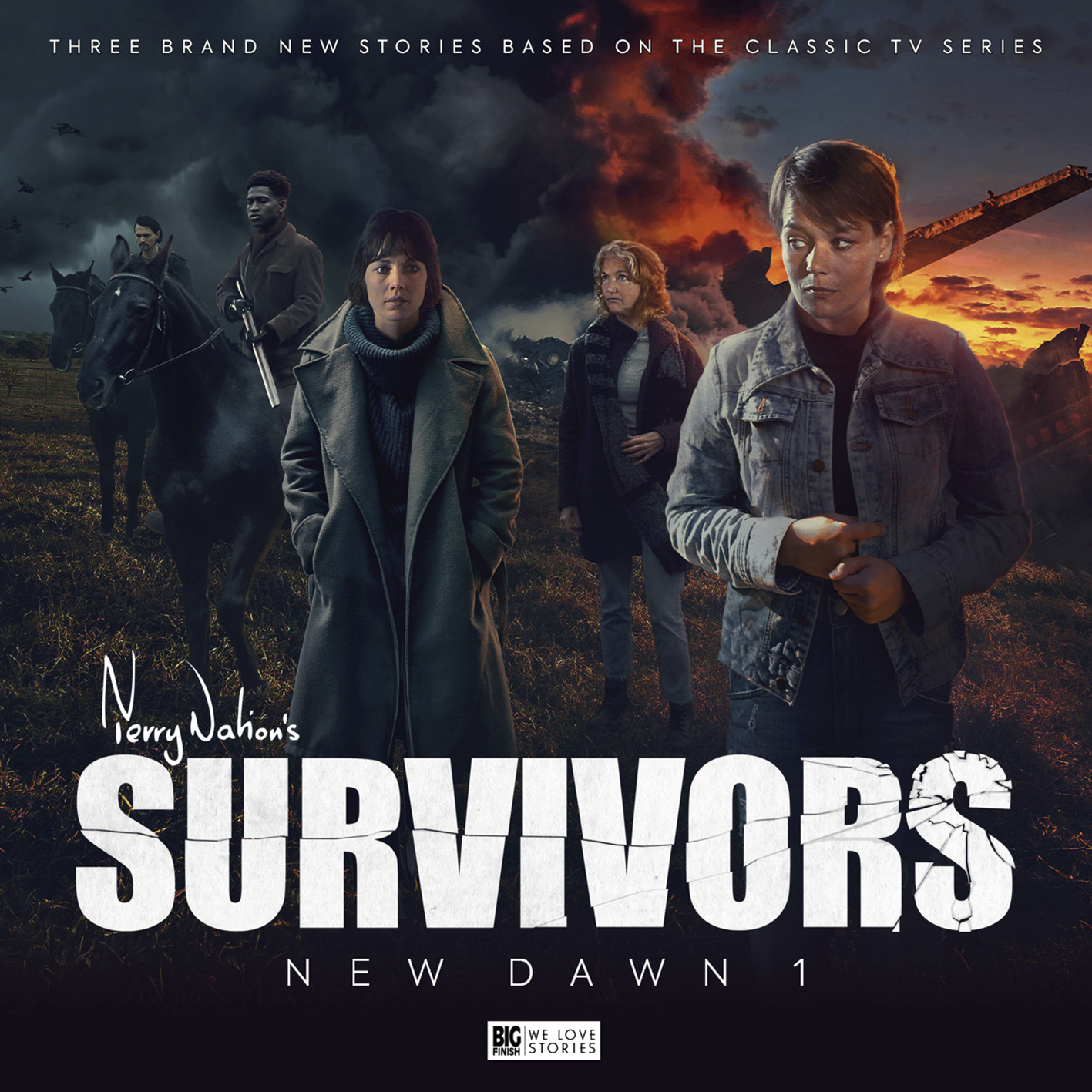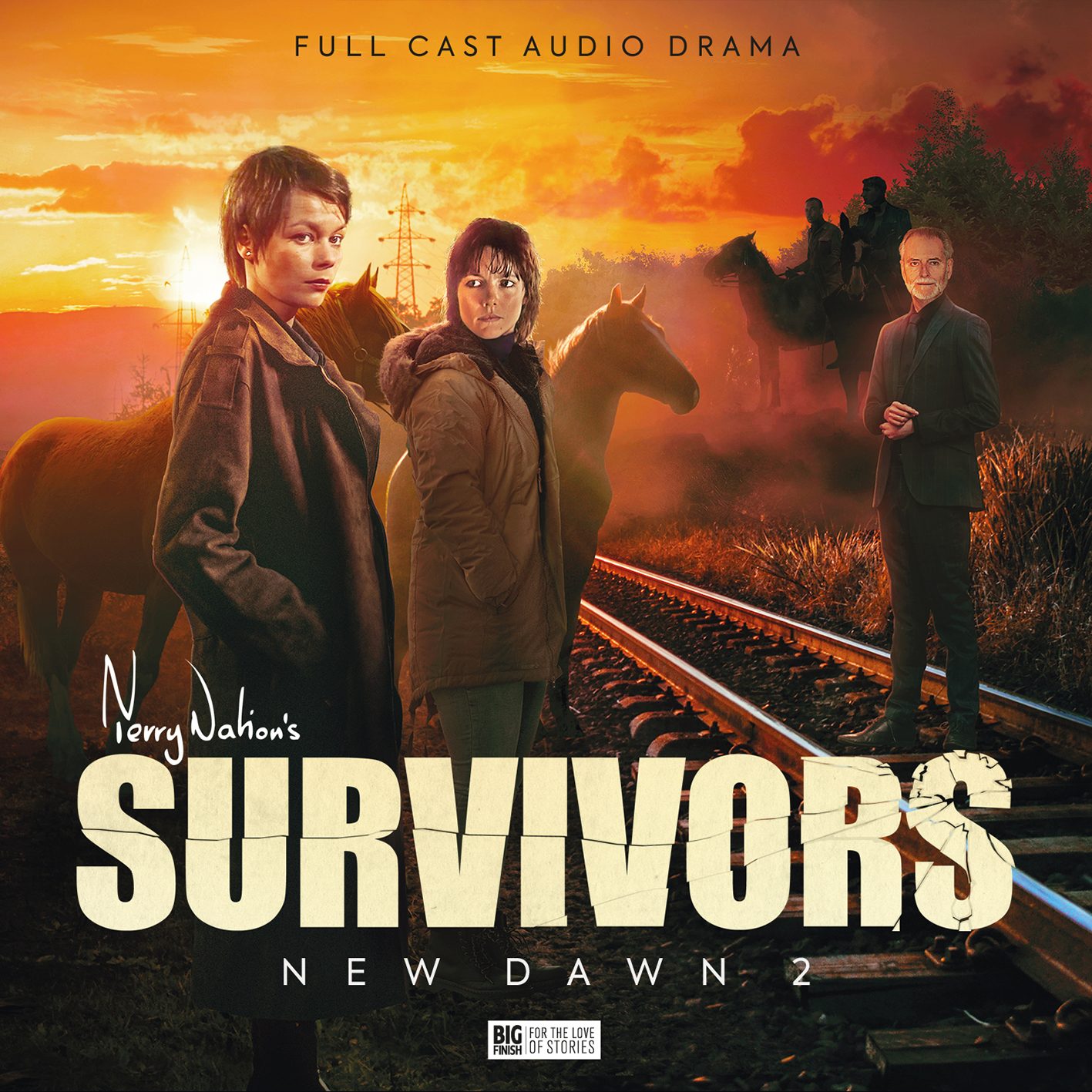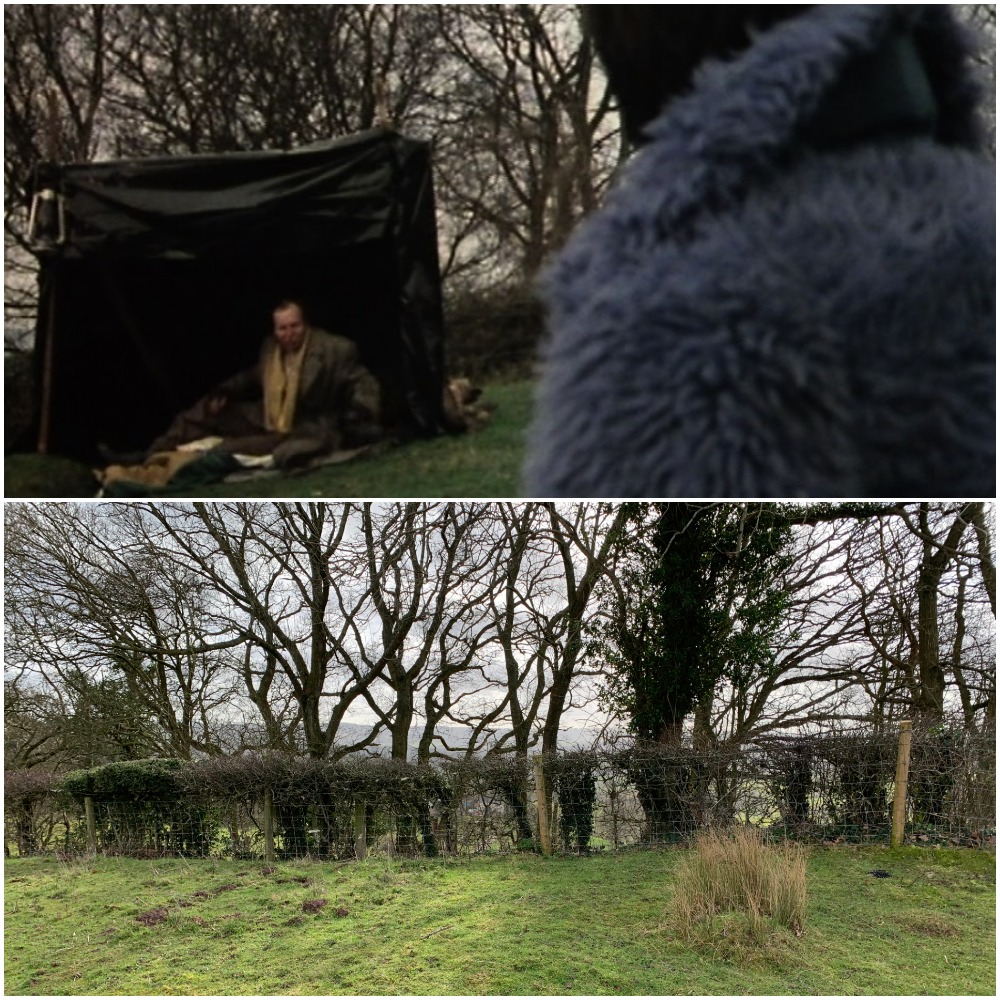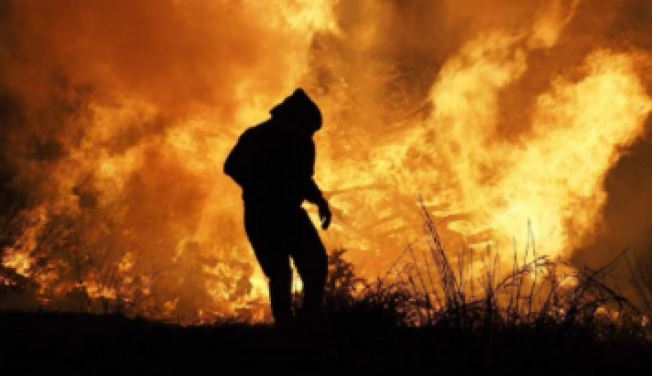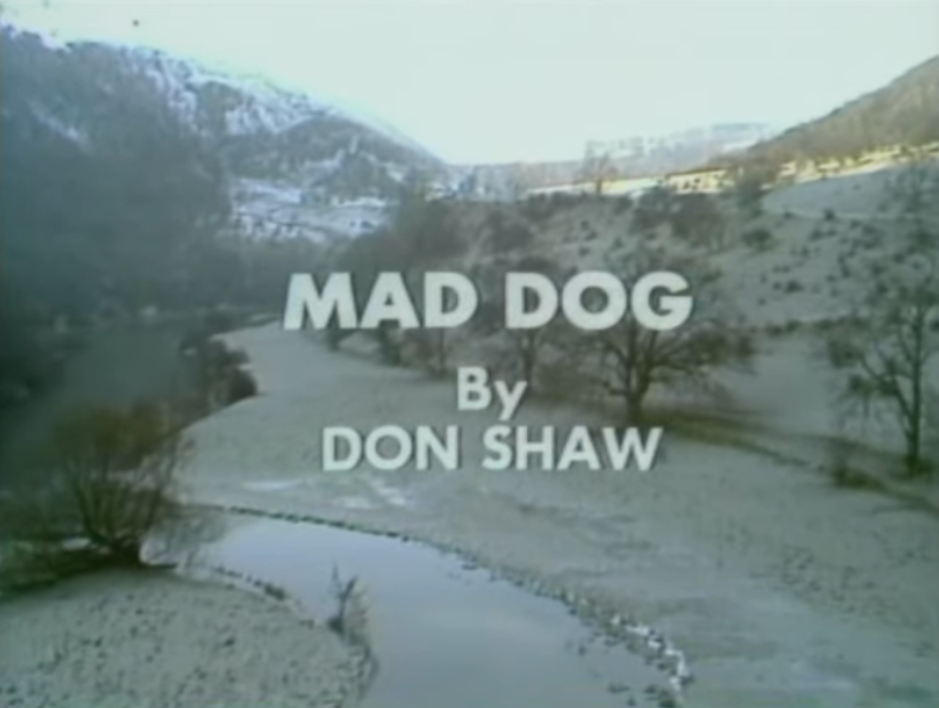
ONE OF THE outstanding episodes of the third series, Mad Dog is a brilliantly conceived and inventively plotted adventure story. It takes a single regular character from the series, transports him alone into unfamiliar territory, and then, without warning, pitches him into a fight for his life.
The compelling chase that follows provides some of the best action and adventure sequences in the whole of Survivors' three-year run.
Yet what raises Mad Dog to the level of a classic in its genre, is that this simple story of a 'hero in jeopardy' is realised in a way that is intelligent; that offers an unflinching and credible picture of the post-Death world; and which replaces the comforting simplicity of 'black and white' with a moral dilemma made up instead from shades of grey. Mad Dog works so well because it is able to combine these twin elements of 'action' and 'reflection' with an articulate sense of confidence that other series three episodes sometimes struggle to project.
Although Mad Dog is a self-contained episode, it does fill a minor role in moving on the series' 'story arc' – the endless search for Greg, and the parallel mission to win support for the ambitious new plan to build a confederation of trading communities. Charles has left Jenny, Agnes and Hubert down-river at the Walter's farm to come on a recovery mission. He is determined to find the missing Tom Walter, and to return him to his family as soon as possible so that he and his party can continue their journey. He fails but, at the end of the episode, Charles discovers the steam train enthusiasts who aid his escape and who return in Bridgehead with Tom aboard.
Unique episode
The filming of Mad Dog is well remembered by the Survivors' production team for three principal reasons. First, there was the appalling weather conditions in which the company was forced to work, and the technical problems — such as freezing camera mechanisms — that accompanied the snow and ice. Delays and re-shoots on Mad Dog cut into production time set aside for a Roger Parkes' story (thought to be called Bleak Start), which was then dropped from the schedule, bringing the series in an episode short as a consequence.
Second, Mad Dog is recognised as the episode which confirmed that Ian McCulloch had been replaced as the 'leading man' on the series by Denis Lill — the loss of the hero's role in Mad Dog was a snub that the BBC knew would enrage the already deeply unhappy McCulloch. Third, the episode is unique in Survivors in excluding all but one of the series' regular cast — putting the spotlight on the character of Charles Vaughan.
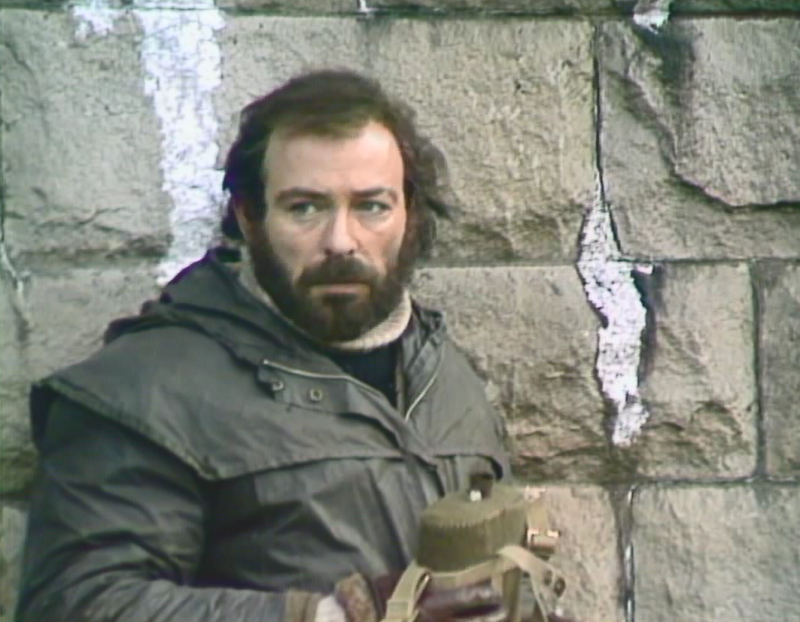
Mad Dog opens on a desolate and bleak winter landscape. Those lazy, hazy summer afternoons at Whitecross seem a world away. Wrapped up against the bitter cold, Charles is a solitary traveller on horseback. Attacked by wild dogs, Charles is saved from serious injury by the arrival of Fenton, a melancholy loner unimpressed by Charles' plans for the future. Charles is shocked to learn that he may have contracted rabies through a dog bite on his arm. Hearing of his meeting with Greg, Charles is anxious to look over Fenton's diaries that record the comings and goings of visitors to the area.
Charles enthuses that they are an invaluable social record and census. When Fenton falls ill, Charles summons help from two of his nearby friends, Sanders and Jim. After a terrifying confrontation, the now rabid and delirious Fenton is shot dead. Charles is then forced to reveal his own bite wound. Sanders and Jim see no alternative but to execute Charles to prevent the spread of the disease.
Clash of perspectives
Though wounded Charles is able to escape, but his attackers are quickly in pursuit. Surviving a grueling and relentless chase, Charles recovers Fenton's logbook, but eventually succumbs to exhaustion and collapses. He is rescued by Ellen, but his position is betrayed and again he has to flee. With all reserves gone, and the hunters in hot pursuit, Charles appears done for. The climax of the episode is a genuine surprise. Rather than have Charles evade the hunters one last time before struggling off into the sunset, we see him stumble across a working steam train. Hauling himself aboard, he passes out as the train sets off.
The small community that lives and works around the train station nurses Charles back to health. They agree to carry him back down river toward his waiting friends. As he urges them to push ahead with the re-opening of more track, Charles learns once again that Greg Preston has been here before him.
Charles' optimism and sense of mission clashes with Fenton's intellectual nihilism
Rich Cross
Don Shaw's script for Mad Dog is one of the best of the entire three-series' run. The central premise is excellent, the 'chase' is well constructed – with the dialogue kept to a minimum at vital moments of tension — but it is the strength of the characterisation that works so surprisingly well amid all the action. The personality of Fenton is particularly well drawn. Within just a few minutes of dialogue he is established as a complex and engaging figure, keen to tease Charles about his 'delusions' of a 'new order', but also happy to concede he has no better alternative of his own.
It is an effective clash of perspectives, with Charles' optimism and 'sense of mission' butting up against Fenton's intellectual nihilism. Fenton's keen wit does a good job of needling Charles. Their early meeting suggests that the episode will become a sharply focused study of the clash of two world views – that is until Shaw suddenly shifts gear and takes off in a very different direction. The role of Ellen is also as well conceived as the brevity of her appearance allows. Her willingness to trust Charles, and to place herself at risk to help him, is a telling a contrast both to the moral emptiness and resignation of Fenton, and to the cold and clinical 'practicality' of Charles' pursuers.
Raging and foaming
The performances in Mad Dog are excellent throughout. That said, Morris Perry's portrayal of the doomed Fenton is worth singling out for particular praise. There is no question that Dennis Lill is terrific as the fugitive Charles — stripped of his self-assuredness, vulnerable and utterly alone; he burns with a determination to survive. Lill seizes the opportunity to shine in this 'showcase' episode with all the gusto and panache you'd expect. But it is Perry who lifts the episode to a different level.
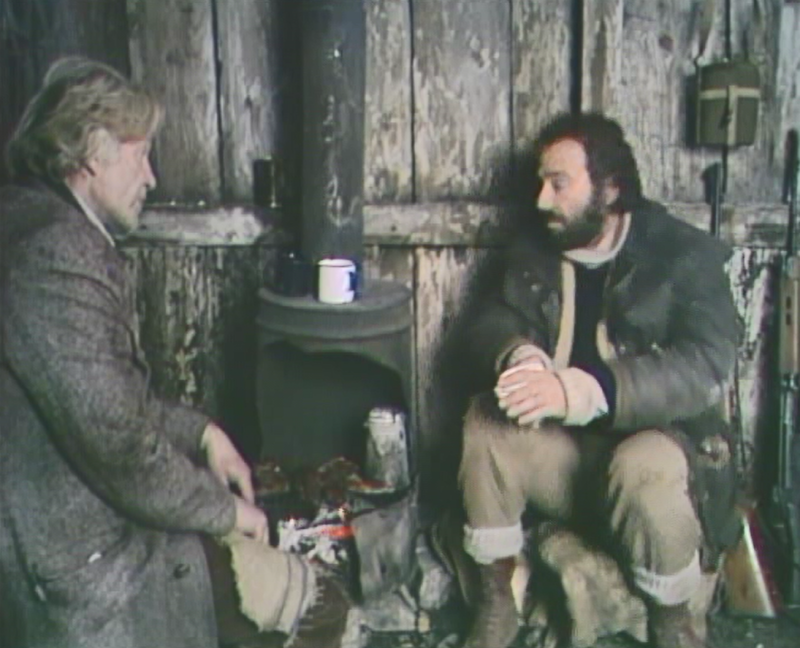
He is utterly convincing as the world-weary sceptic and passive observer of other people's efforts, yet he is also genuinely disturbing as a deranged rabies' victim. Fenton's sickbed scenes, and his later confrontation with Charles, Sanders and Jim at his halfway house, could so easily have come across as ridiculous rather than as frightening. As Perry presents it, Fenton's self-destructive delirium is horrifying – even as he staggers about, raging and foaming at the mouth, as dramatic portrayal of the illness demands.
The episode is given real urgency and momentum by Tristan de Vere Cole's tight direction and sharp editing. The camerawork is stunning, the deep-winter locations are a character on their own — they look every bit as hostile and treacherous as they must have been to work in. The story moves through countryside thick with snowdrifts, and topped with sheets of frost and ice. Early on Fenton and Charles trudge through a wind-whipped snowstorm. Later on as Charles flees on foot through barren woods, ice-cold rivers, and fields frozen in ruts, the weather swiftly takes its toll and nearly finishes him off.
The pack of wild dogs that attack Charles and Fenton are convincingly aggressive. This was one episode where our Survivors definitely suffered to deliver the programme. Given the tight production deadlines, and the appalling conditions in which the Survivors' team were forced to work, the quality of the finished product is really quite remarkable.
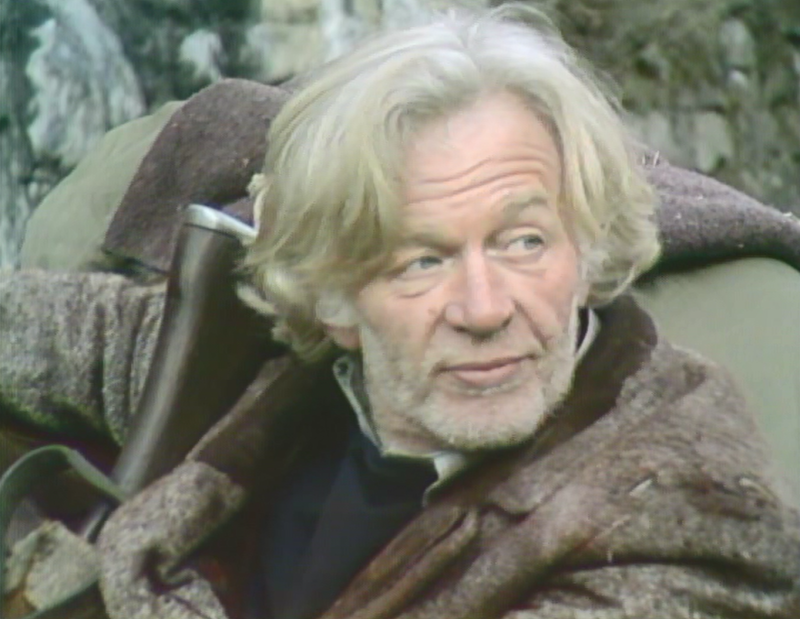
De Vere Cole's confident style allows the 'Mad Dog' metaphor in Shaw's script to be highlighted without being overstated. It is most obvious in the scene when Charles is holed up in Ellen's barn. Charles — filthy and exhausted — is chained up on all fours in the straw, his food dish before him on the floor, his pursuers closing in for the kill. Reduced to the level of a wild animal, by strangers determined to protect their community from the threat of infection and disease.
Greater good
Here again it is the sophistication of the script that makes the drama so compelling. Jim and Sauders are not presented as 'bad' people. They may come across as callous, but there is nothing really cruel in their hunt for Charles. Their fear of a rabies outbreak is legitimate. They want Charles dead only because of the menace that he might pose to others. They are not driven by greed nor maliciousness. The post-Death world is an unforgiving place. Sanders decides that they cannot risk letting Charles go, because the circumstantial evidence against him is so strong: he has had recent contact with the infected Fenton; and has been injured in a dog attack that has left bite marks.
Without hospitals or laboratories they cannot know for sure if Charles is a carrier. But then neither can Charles, yet. To protect themselves they decide to sacrifice Charles for the 'greater good'. Driven by his own survival instincts Charles flees for his life — determined to save himself and to return to his community, despite the risk.
Sanders decides that they cannot risk letting Charles go, because the circumstantial evidence against him is so strong
Rich Cross
Survivors' viewers want him to make good his escape, but have to wonder how Charles would have dealt with a suspected rabies carrier found wandering near Whitecross? In the circumstances that confront our survivors, which is the greater evil: to kill a man, who may, or may not, be ill with a disease that can't be cured, and which threatens to kill others in a grotesque and painful way; or to allow him to live and risk being responsible for him spreading the illness and condemning others to death?
Our survivors have to reach their decision without the one piece of information that they need to make an informed choice. It's a terrible dilemma. Thinking about it dispassionately, at the moment when Sanders concludes that Charles must die, and Charles decides that he must escape: who is being rational and level-headed, and who reckless and selfish?
Small notebook
Is it possible to find fault with the episode? Yes — at a push. The editing on Charles' fight with Jim and Sanders is perhaps not as deft as it could be. It also seems unlikely that the irreplaceable 'library' of Fenton's that Charles is so desperate to get his hands would be contained in the single small notebook that Charles pockets. And perhaps Shaw could have resisted the temptation to add in yet the another Survivors' 'simpleton' in the shape of the clueless Ron. But these are all petty and marginal criticisms.
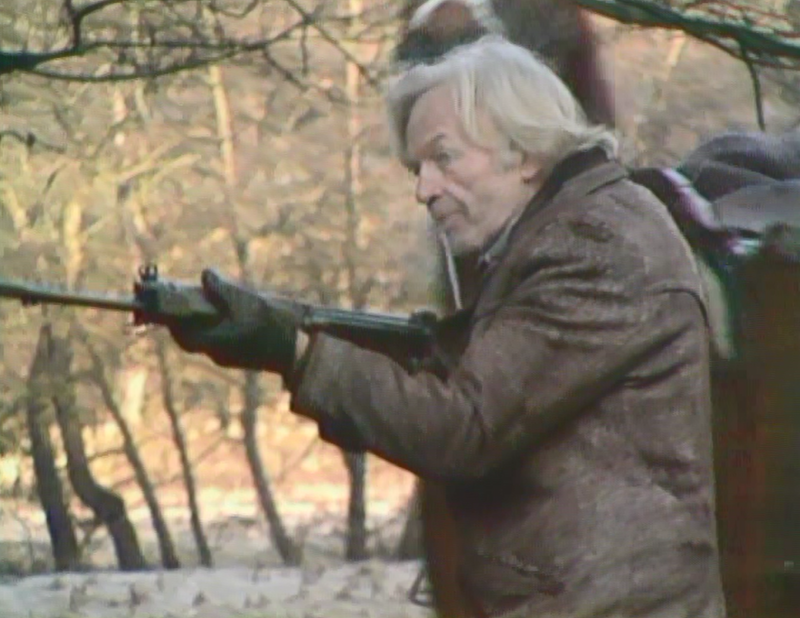
Mad Dog is Survivors at its very best – a cracking adventure episode, that is thoughtful, coherent and grown-up. Yet it's as well to remember that it is the contrast with other episodes that makes Mad Dog work so well. If all series three episodes had gone for a similar format, the series would have suffered. The programme would have lost its richness and variety. It would have failed to develop a regular cast of engaging characters that could hold audience interest. The series would also have had to forgo the story development that leads finally to Felbridge and to Loch Mannoch — and, leaving aside the 'rights' and 'wrongs' of those particular destinations, it is important that the series travelled somewhere.
If other more 'plot driven' series three storylines are sometimes a little slow and creaky in places, that's more often a reflection of the short-comings of particular scripts, than 'proof' of the need for more simple 'action' stories. Which is in no way to knock this exemplary adventure piece. Mad Dog isn't simply one of the strongest episodes of the whole Survivors' run. It is without doubt one of the best 50 minutes of drama produced by the BBC in the whole of the 1970s.
Rich Cross
This review also appears in the reviews section of the Survivors: Mad Dog site.
Cite this web page
Cross, R. (2021). 'Mad Dog: Review,' [online] Survivors: A World Away, 31 January. Available at: https://survivors-mad-dog.org.uk/a-world-away/Archive_Rev_MD.php. Accessed on: 03 March 2026.
Current style: Harvard
TAGS

